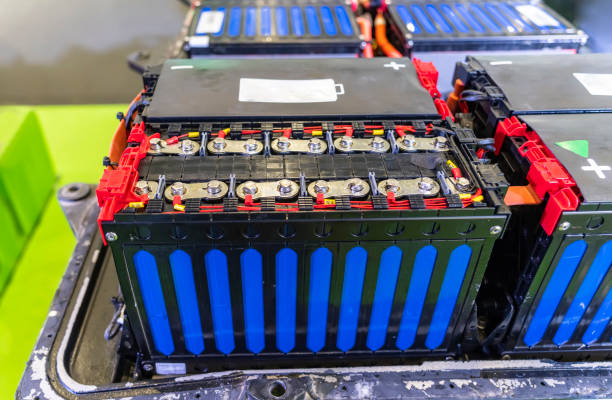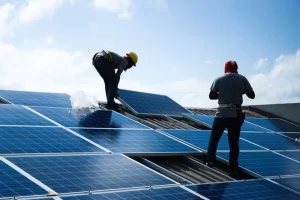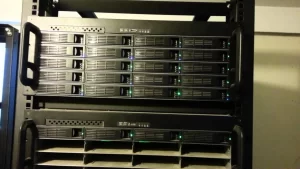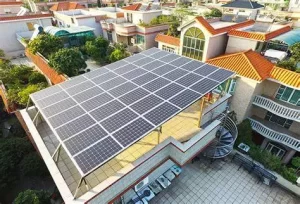How to Choose the Right Hybrid Inverter and Battery System to Optimize Energy Usage
In the ever-evolving landscape of energy management, hybrid inverters and battery systems have emerged as pivotal components in optimizing energy usage for both residential and commercial applications. This article will delve into the essential aspects of selecting the right hybrid inverter and battery system to ensure maximum efficiency and cost-effectiveness.

Understanding Hybrid Inverters and Battery Systems
Hybrid Inverters:
A hybrid inverter is a versatile device that combines the functionality of a traditional inverter with a battery charger. It can convert DC power from renewable sources, such as solar panels, into AC power for household use, while also managing energy storage in batteries. Hybrid inverters are designed to work with various energy sources, including solar panels, wind turbines, and the electrical grid. Their primary functions include:
– Energy Conversion: Converting the DC power generated by renewable sources into AC power for use in your home or business.
– Energy Storage Management: Charging batteries with excess energy and discharging them when needed.
– Grid Interaction: Managing the flow of electricity between the grid, renewable energy sources, and batteries.
Battery Systems:
In a hybrid energy system, batteries store excess energy generated from renewable sources. This stored energy can be used during times when generation is low or when demand is high. Batteries help maintain a stable power supply and provide backup power during outages. Key considerations for battery systems include:
– Capacity: The amount of energy a battery can store, usually measured in kilowatt-hours (kWh).
– Depth of Discharge (DoD): The percentage of the battery’s capacity that can be used before it needs recharging.
– Cycle Life: The number of charge and discharge cycles a battery can undergo before its capacity significantly degrades.
Factors to Consider When Choosing a Hybrid Inverter and Battery System
- Power Requirements
– Calculate Your Energy Needs: Assess your household or business energy consumption to determine the power rating required for the inverter. This involves analyzing your daily energy usage and peak demand.
– Match Inverter Capacity: Ensure the hybrid inverter’s power rating is sufficient to handle your energy needs. For instance, a residential system might need an inverter rated for 5-10 kW, while commercial systems might require higher capacities.
- Battery Capacity and Type
– Determine Battery Size: Based on your energy consumption patterns, select a battery with adequate capacity to store enough energy for your needs. Consider both daily and seasonal variations in energy use.
– Choose Battery Chemistry: Different battery types, such as lithium-ion, lead-acid, and flow batteries, offer varying performance characteristics. Lithium-ion batteries, for example, are known for their high energy density and longer lifespan, making them a popular choice for many hybrid systems.
- System Compatibility
– Inverter and Battery Matching: Ensure the hybrid inverter is compatible with the battery type you choose. Compatibility issues can affect system performance and efficiency.
– Integration with Existing Systems: If you have existing solar panels or other energy sources, confirm that the hybrid inverter can integrate seamlessly with these components.
- Budget Considerations
– Initial Costs: Hybrid inverters and batteries represent a significant investment. Compare prices and features to find a system that meets your needs within your budget.
– Long-Term Savings: Consider the potential for cost savings on energy bills and maintenance. High-quality systems may have higher upfront costs but offer better performance and durability over time.
- Energy Management Features
– Smart Technology: Look for hybrid inverters with advanced energy management features, such as real-time monitoring, remote control, and automated load management. These features can enhance system efficiency and user convenience.
– Backup Power Capabilities: Ensure the system can provide reliable backup power during outages, especially if you live in an area prone to power disruptions.
- Regulatory and Warranty Considerations
– Compliance: Verify that the hybrid inverter and battery system comply with local regulations and standards. This ensures safety and efficiency and may be required for incentives or rebates.
– Warranty: Review the warranty terms for both the inverter and the battery. A longer warranty period can provide peace of mind and protection against potential issues.
Steps to Selecting the Right System
1.Conduct a Comprehensive Energy Assessment
Begin by evaluating your energy needs and usage patterns. This involves reviewing your electricity bills, analyzing peak usage times, and considering future energy requirements.
2.Research and Compare Products
Research different hybrid inverters and battery systems available in the market. Compare their features, capacities, efficiencies, and prices. Look for reviews and testimonials from other users to gauge performance and reliability.
3.Consult with Professionals
Seek advice from energy professionals or consultants who can provide expert guidance on system selection. They can help you assess your needs, recommend suitable products, and ensure proper installation.
4.Plan for Installation and Maintenance
Consider the installation requirements and ongoing maintenance needs of the chosen system. Ensure you have access to qualified installers and service providers who can handle the installation and upkeep of your hybrid inverter and battery system.
5.Monitor and Optimize Performance
Once the system is installed, use monitoring tools and software to track its performance. Regularly review energy usage, battery health, and system efficiency to ensure optimal operation.
Conclusion
Choosing the right hybrid inverter and battery system is crucial for optimizing energy usage and maximizing the benefits of renewable energy sources. By understanding your energy needs, evaluating different products, and considering factors such as compatibility, budget, and features, you can make an informed decision that enhances your energy management strategy. With the right system in place, you can achieve greater energy independence, cost savings, and environmental sustainability.
Contact us
- Email:[email protected]
- Tel: +86 13651638099
- Address: 333 Fengcun Road, Fengxian District, Shanghai
Get A Quote Now!

Read more

Unveiling Photovoltaic+Energy Storage: Four Major Application Scenarios Leading the Future of Energy
In this way, the energy landscape is evolving, and one of the most thrilling developments in renewables is the integration of photovoltaics energy storage.

From Theory to Practice: Four Methods for Estimating Photovoltaic Power Generation
Photovoltaic power generation has become an essential part of modern energy solutions, particularly in home solar systems and distributed power applications

Rack-Mounted Lithium Iron Batteries: Creating Efficient and Reliable Energy Storage Solutions
When it comes to modern energy solutions, rack-mounted lithium iron batteries are taking center stage in a variety of industries. Whether you’re powering data centers, stabilizing energy for households, or keeping critical systems online at 5G base stations, these batteries have become the unsung heroes of our electrified world.

Late Night Energy Saving Tips: How to Maximize Electricity Savings During Off-Peak Hours
With rising energy costs, homeowners are increasingly exploring innovative ways to save on their electricity bills. One effective approach is utilizing off-peak hours—times when electricity rates are significantly lower due to reduced demand.
